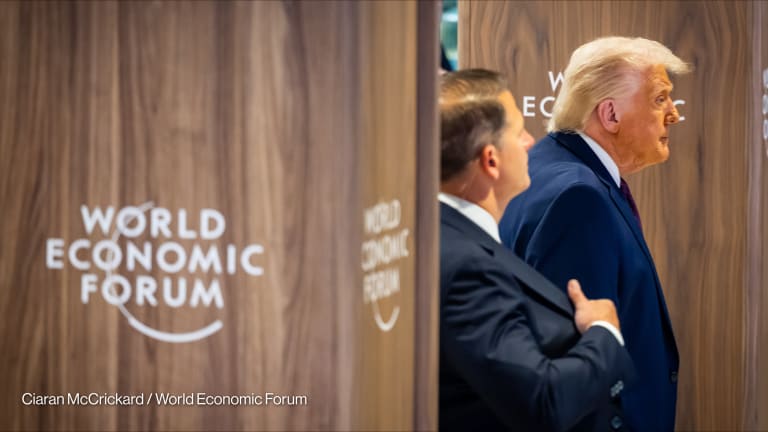
The World Economic Forum is over — and by Friday, the once-pulsating promenade of Davos had been transformed.
Even before the last sessions ended, nearly every company-rented storefront was gone. Amazon was cleared by late morning, and the South Africa House, which had been decked out just hours before, looked more like a furniture clearance sale by noon.
This is a preview of Newswire
Sign up to this newsletter for an inside look at the biggest stories in global development, in your inbox daily.
Throughout the day, workers used blow dryers to scrape vinyl off the windowpanes, and slowly, the real Davos began to reassemble itself. So now that the streets are stripped of their artificial intelligence gold, what did we learn from Davos 2025?
First, that the global development community was out in force — and that they hustled their way through the entire week. Second, that change is afoot not just for our readers, but for the world at large. And third, that AI isn’t going anywhere, and it’s up to the development world to figure out how it’s going to embrace it or not.
Of course, that’s not everything we picked up during this year’s WEF. Read on to explore the last Davos Dispatch of the year, and stay tuned for the WEF-related podcasts, articles, and other content that will continue to come your way.
Hefty price tags
In May 2023, Uganda implemented an anti-LGBTQ+ law that rocked the nation. Aside from the life imprisonment it imposed — along with the death penalty for what Uganda referred to as “aggravated homosexuality” — it also cost the country up to $1.6 billion in a single year, according to research from coalition group Open for Business.
“There were so many very tangible costs that came in very quickly,” the organization’s CEO, Dominic Arnall, tells me. “That’s between 3% and 5% of its GDP.”
The World Bank ceased new loans to Uganda. The United States withdrew Uganda’s African Growth and Opportunity Act, or AGOA, status. And there was also a hit to business, tourism, and talent, Arnall says, all with an economic cost.
“Countries with low levels of LGBTQ+ inclusion tend to experience higher levels of brain drain,” Arnall says. “That means young people leaving the country.”
On the other hand, Arnall described how Thailand — which became the first country in Southeast Asia to recognize same-sex marriage last June — has used that change to make a “very explicit play for LGBTQ+ tourism.”
“They’ve made very clear that they want to appeal to this community, that they know it brings money into the country,” he says.
Watch the full conversation: Uganda’s anti-LGBTQ+ law cost the country $1.6B, business coalition says
Trouble in Uganda
That’s not the only trouble afoot in Uganda, a country that for years has been considered a darling of the development world. UNAIDS Executive Director Winnie Byanyima shared an update on her husband with Devex, describing how his case is part of a broader nationwide pattern to silence political opposition.
Kizza Besigye was taken into detention last November. Besigye has contested and lost four presidential elections against Uganda’s president, Yoweri Museveni, who has been in power since 1986. But in 2024, Besigye formed a new political party — the People’s Front for Freedom — and now, he faces trial in military court.
While civilian courts have repeatedly found her husband innocent, he’s now facing a military tribunal that reports directly to Museveni as army commander. Things took an even darker turn when the president's son, in a now-deleted social media post, announced plans for her husband's execution. The country, which came under Museveni's leadership through armed revolution, has yet to experience a peaceful transfer of power.
Even so, Byanyima tells our president and editor-in-chief, Raj Kumar, that she’s remaining optimistic.
“I feel supported by a movement of pro-democracy and pro human rights actors,” she says.
Think outside the bot
Let’s turn to Ukraine, where the capital city Kyiv has become home to the second Global Government Technology Centre, aka GovTech center. The WEF-backed initiative, unveiled last month, works to exchange tech practices across the world. And on Wednesday, it welcomed a board to accelerate its operations (and those of the first GovTech center in Berlin).
“We proudly call ourselves the digital tiger of Europe,” Zoya Lytvyn, the head of Ukraine’s GovTech center, tells me. “In terms of government and digitalization, that’s our win number one at the moment.”
Much of that is due to Diia, an application that’s connected Ukrainians to government services and digital documents since 2020. Created in collaboration between Ukraine’s Ministry of Digital Transformation and USAID, the app has revolutionized the way Ukrainians deal with their government — something that became even more critical once Russia invaded the country.
Now, Lytvyn hopes the GovTech center will help Ukraine’s government bring Diia (and other Ukrainian-made digital products) to countries across the world, including several African nations that have already expressed interest.
Digital’s supersonic growth
$24 trillion
—That’s how much the digital economy is projected to grow in 2025, according to Deemah AlYahya, secretary-general of the Digital Cooperation Organization, a multilateral organization that focuses on digital economic inclusion. That’s three times the traditional economy, AlYahya adds, a figure that’s being driven by the growing adoption of AI, automation, and robotics.
“We truly believe that the digital economy is the economy that’s going to flourish — not in the future, but now,” AlYahya tells me.
That’s not to say that growth will be across the board. Creating a single AI-grown image consumes as much energy as charging a smartphone, AlYahya says, while today, 2.7 billion people still remain unconnected to the internet — let alone AI.
“If they’re not even connected, and we’re talking about an intelligent age, we’re increasing that divide more,” she says.
Watch: The $24 trillion digital boom — a double-edged sword for global growth
Related opinion: Digital inclusion must be central to global economic growth plans
Restoration pays
For more on the intersection of tech and development, enter the rise of “land-preneurs,” a new generation of tech-savvy youth breathing life into degraded farmlands.
Ibrahim Thiaw, the executive secretary of the United Nations Convention to Combat Desertification, tells Raj how “land-preneurs” — mostly educated youth returning to their families’ degraded farmland — are transforming worn-out fields through tech-enabled ventures. These range from solar-powered irrigation systems to innovative food processing. One standout? A Mauritanian entrepreneur turning discarded date seeds into decaf coffee.
“Gen Z is very creative,” Thiaw says. “The same sun that is rotting the meat can actually be used to conserve it.” But with 40% of Earth’s land already degraded and global food demand set to double by 2050, both small and large-scale solutions are needed.
Enter the Great Green Wall — an ambitious program that combines tech-enabled farming, renewable energy, and water access to restore degraded land across the Sahel. The model is catching on: Saudi Arabia has committed $2.5 billion for a Middle East version, while Southern Africa is launching its own under South Africa’s presidency of the Group of 20 largest and emerging economies.
Turns out land-preneurs might be onto something — restoration pays.
+ Sign up to Devex Dish, our free, weekly newsletter covering the transformation of the global food system.
A microfinance shake-up
Speaking of dollars and cents, we found out one organization is trying to push a digital facelift for microfinance. Pro Mujer CEO Carmen Correa tells Devex how the organization, which provides financial and health services to women across Latin America, is shaking up its decades-old model.
The biggest change? Moving from in-person community banking to WhatsApp groups for loan meetings, a shift that acknowledges their clients’ biggest constraint: Time.
“We need to keep adapting ourselves, and we need to keep changing,” Correa says, pointing to how working women juggle businesses and families. “We want to make sure that nobody is left behind.”
But it's not just about going digital. Pro Mujer is making an even bigger pivot, transforming from a traditional nonprofit foundation into a social enterprise. The idea? Make each service line, from health to education to financial services, sustainable on its own.
Playing nice
Development banks have been promising to work together for years. Now, there might actually be some movement — though you might not want to break out the champagne just yet.
Alvaro Lario, the president of the International Fund for Agricultural Development, tells us that multilateral development banks are making some concrete progress on collaboration. The latest development? A digital platform where MDBs can see each other’s project pipelines and coordinate their investments — transparency that, hopefully, will cut down on duplicate efforts and transaction costs.
“We're very satisfied with how MDBs have come together,” says Lario, pointing to practical changes like standardized procurement processes. It's also good news for countries that have long struggled with juggling “30 requests from very different organizations” that weren't talking to each other.
“There’s been not only a mindset shift, but operationally, there have been things put together,” Lario explains.
Even so, time will tell whether these bureaucratic fixes translate into real efficiency gains.
Related: World Bank, Asian Development Bank under fire for mutual reliance plan (Pro)
ICYMI: As aid budgets shrink, how did support for this UN agency grow? (Pro)
+ Not yet a Devex Pro member? Start your 15-day free trial today to access all our expert analyses, insider insights, funding data, exclusive events, and more.
Today, at 12 p.m. ET (6 p.m. CET), we’re hosting an exclusive Devex Pro briefing to analyze the implications of the Trump administration’s foreign aid freeze for USAID and its partners. Register for the event now.
‘Extremely messed up’
Speaking of inefficiencies, “extremely messed up” is how Sumant Sinha, the CEO of ReNew, India’s largest global renewable energy company, describes the global carbon market.
“I mean, there's just no other word to describe it,” Sinha says. “You have local markets that are operating in some ways and then some bilateral agreements that are dictated by what the buyer country is wanting. We need a global carbon pricing that is consistent across the world.”
At the 29th U.N. Climate Change Conference in Baku, Azerbaijan, the world agreed on a global framework to do so — but now, it needs to be fully operationalized.
“We need to go from all of this complication to just one single carbon market globally with one single price,” Sinha says. “And that journey is going to be a long and arduous one.”
Background reading: Will carbon markets enabled by COP29 really mean $80B for Africa?
Sign up to Newswire for an inside look at the biggest stories in global development.








